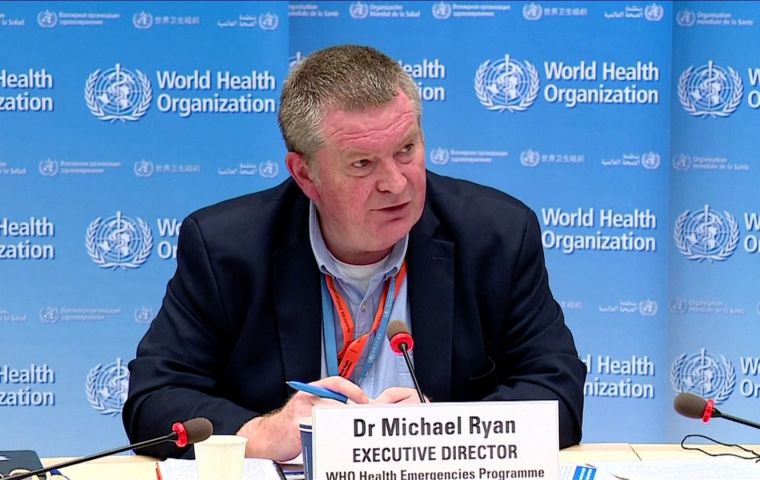MercoPress. South Atlantic News Agency
WHO cautions that despite good progress in developing Covid-19 vaccines, first use is still far, early 2021
 WHO is working to ensure fair vaccine distribution, but in the meantime it is key to suppress the virus' spread, said Dr Mike Ryan cautioned
WHO is working to ensure fair vaccine distribution, but in the meantime it is key to suppress the virus' spread, said Dr Mike Ryan cautioned Researchers are making “good progress” in developing vaccines against COVID-19, with a handful in late-stage trials, but their first use cannot be expected until early 2021, a World Health Organization (WHO) expert said on Wednesday.
WHO is working to ensure fair vaccine distribution, but in the meantime it is key to suppress the virus' spread, said Dr Mike Ryan, head of WHO's emergencies program, as daily new cases around the globe are at near-record levels.
“We're making good progress,” Dr Ryan said, noting that several vaccines were now in phase 3 trials and none had failed so far, in terms of safety or ability to generate an immune response.
“Realistically it is going to be the first part of next year before we start seeing people getting vaccinated,” he told a public event on social media.
Aubree Gordon, associate professor of epidemiology at University of Michigan School of Public Health, said early trial results are showing promise.
“The results of Phase 1 and/or Phase 2 trials, have been very promising. We should definitely believe these results, while acknowledging that they do not prove the vaccine is effective,“ she said.
”These early phase trials address safety and whether the vaccine elicits a good immune response. The good news is that we have several vaccines that have or are moving forward into phase 3 trials - the phase needed to prove it works for licensing.”
Amesh Adalja, senior scholar at Johns Hopkins University Center for Health Security, said it is “hard to draw any firm conclusions” from the early trial results and noted that the AstraZeneca-Oxford vaccine “has animal data”.
“I'm confident we'll get a COVID-19 vaccine, just not sure which candidates will make it into people's arms,” he added.
But while several potential vaccines are showing promise ”because they're built off other successful efforts“, global competition instead of collaboration is ”harming“, said Matthew Kavanagh, assistant professor of global health and visiting professor of Law at Georgetown University.
”In this pandemic, we need to quickly realize there are better ways of doing this,” he added. The Infectious Diseases Society of America noted that phase 3 trials had begun within seven months of the virus' genetic sequencing.




Top Comments
Disclaimer & comment rulesCommenting for this story is now closed.
If you have a Facebook account, become a fan and comment on our Facebook Page!